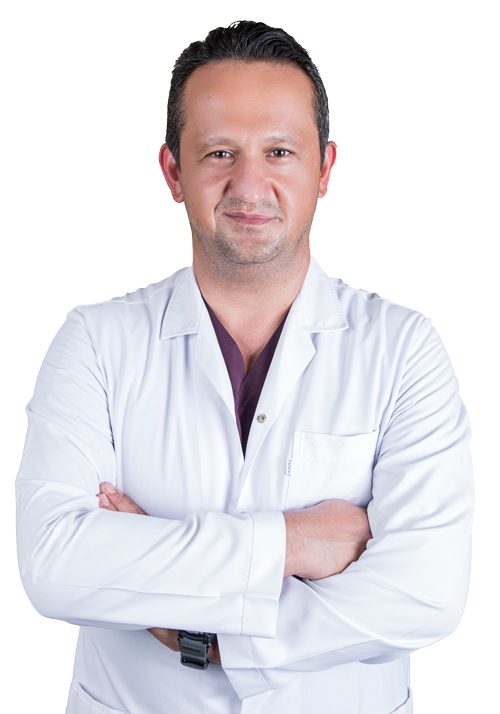BRAIN AND NERVE SURGERY
_1691068360.png)
Brain and nerve diseases (Neurosurgery) is a branch of science that deals with the diagnosis and treatment of head and spinal cord injuries, especially lumbar and cervical herniated discs, cerebral vascular occlusions and cerebral haemorrhages, aneurysms (bubble formation) in the vessels supplying the brain and spinal cord, tumours originating from the brain and spinal cord tissue or pressing on these tissues. The dictionary meaning of neurosurgery, which is derived from the words neuron and neurosurgery, is "healing the wounds of the nervous system". In the brain and nervous diseases clinic, diagnosis and treatment of diseases seen in both adult and paediatric patient groups are performed. Necessary diagnosis and treatment methods are applied by working together with neurology, neuroradiology, neuroanesthesia departments.
Diseases frequently encountered in neurosurgery and conditions requiring intervention can be listed as follows:
Stroke and paralysis due to cerebrovascular occlusion due to various reasons
Life-threatening aneurysms that occur in the form of bubbles in the brain vessel, sometimes accompanied by bleeding
Cerebral haemorrhage in the brain tissue and membranes
Carotid (carotid artery) obstruction or narrowing (carotid stenosis)
Tumours in the brain and spinal cord
Traumatic conditions caused by accidents and injuries
Lumbar and neck hernia
Paediatric, in other words, tumours and vascular diseases found in child patients
Brain pacemaker applications for Parkinson's and similar patients
Brain Haemorrhage
Cerebral haemorrhage is a disease that occurs as a result of rupture of the arterial wall in the brain and blood leaking into the brain tissue, causing oedema, tissue damage and compression in this area. Cerebral haemorrhage, which may occur due to any accident, impact, injury, etc. or spontaneously, is a disease that requires urgent intervention. In the treatment of cerebral haemorrhage cases, which usually require surgery, the intervention of the neurosurgery unit of hospitals or other health institutions is required.
Brain Tumours
Tumours are masses that can be benign (benign) or malignant (malignant) and can occur in various parts of the body. Malignant tumours are known as "cancer". Tumours in the brain cause symptoms such as "nausea, vomiting, balance problems, forgetfulness, fainting, visual disturbances (double vision, etc.), numbness in arms and legs" and these symptoms negatively affect the quality of life of people. People with these complaints should consult a neurosurgery unit.
Spinal Disorders:
Joint-muscle pains, curvature, tumours, lesions, hunchback (kyphosis), scoliosis and infections developing in the spine area are spinal disorders. Spinal diseases, which can occur depending on age, can also be experienced as a result of trauma such as an accident, impact or injury. These types of diseases cause chronic pain, numbness and may adversely affect the mobility of people.
Stroke
Stroke is a condition in which the blood flow to the brain stops, resulting in symptoms such as "weakness in the arms and legs, severe and sudden headache, loss of balance, difficulty in speaking and understanding". If the blood flow to the brain is blocked or completely stopped, cell death begins in the brain. As a result, brain damage may occur and life may be seriously endangered. There are two different types, ischaemic and haemorrhagic. While ischaemic stroke is caused by a blood clot, haemorrhagic stroke is a condition caused by damage to the brain as a result of a burst due to high blood pressure in one of the vessels supplying the brain. In addition, transient ischaemic attack is a type of stroke that occurs as a result of temporary interruption of blood flow to the brain. Symptoms do not spread over a long period of time and usually develop suddenly. Drowsiness, fatigue, immobility or shifting of a part of the face, dizziness, difficulty in speaking and understanding, severe headaches may be observed. Smoking and alcohol use, high blood pressure, obesity, high cholesterol and diabetes are among the causes of stroke. Depending on the cause of stroke, the type of treatment also varies. It can be treated with medication or surgical intervention. Stroke, which is a serious disease that can lead to death, is a disease whose treatment should not be postponed.
Trauma
Trauma is tissue and organ damage caused by external factors. Spinal cord trauma is the general name given to the injury of the nerve tissue in the spine. It can be seen after events such as sports-related, traffic accidents, falling from a height, armed injuries. In case of injury to the spine, sensory and movement losses may occur. Spinal traumas, for which radiological imaging is used for diagnosis, are treated surgically by neurosurgeons. The surgical method used may vary depending on the severity to which the spine is exposed. Head traumas occur for similar reasons to spinal traumas. Diagnosis of head traumas should be fast and effective. Radiological imaging is often used in diagnosis. Firstly, the damage at the moment of impact is examined. Secondarily, injuries that may develop after trauma are evaluated. Depending on the damage caused by the trauma, the neurosurgeon applies the necessary treatment after evaluating the patient.
Childhood Brain and Nerve Diseases:
The neurosurgery unit also deals with brain and nerve diseases that occur in childhood. Paediatric neurosurgery covers brain and nerve diseases from the womb to the age of 18 and these cases are listed as follows
Congenital brain haemorrhages
Congenital nervous system disorders
Increase in cerebrospinal fluid
Spinal deformities
Head and spinal cord injuries
Spinal cord and vascular diseases
Skull deformities
Spinal cord closure defects
Brain and spinal cord tumours
Water retention in the brain
Epilepsy and other movement disorders



